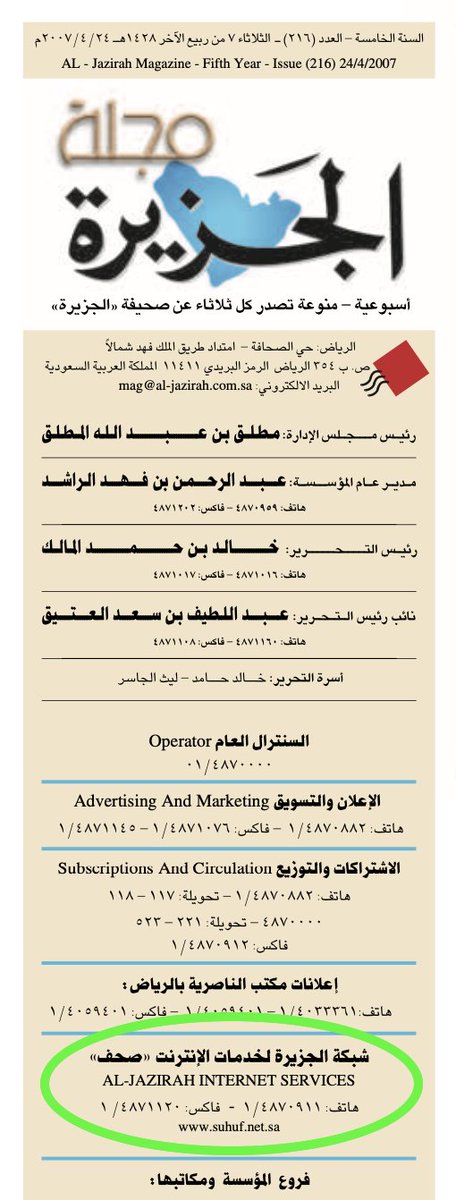THREAD  a former Saudi information minister has called for shutting down local newspapers, renewing debate in the kingdom about the fate of legacy print news organisations as the internet disrupted their old business models and brought them to the verge of bankruptcy —
a former Saudi information minister has called for shutting down local newspapers, renewing debate in the kingdom about the fate of legacy print news organisations as the internet disrupted their old business models and brought them to the verge of bankruptcy —
 a former Saudi information minister has called for shutting down local newspapers, renewing debate in the kingdom about the fate of legacy print news organisations as the internet disrupted their old business models and brought them to the verge of bankruptcy —
a former Saudi information minister has called for shutting down local newspapers, renewing debate in the kingdom about the fate of legacy print news organisations as the internet disrupted their old business models and brought them to the verge of bankruptcy —
Abdulaziz Khoja, Minister of Info between 2009-14, said newspapers fulfilled their role over the last 50 years. “These companies must be declared dead,” he said “It’s over. The [newspaper] companies are now begging the government [to bail them out]. How is this acceptable?”
The old guard of Saudi newspapers was not happy. Khoja’s words were particularly stinging because they came from a man who knew them and was once in charge of overseeing them. Khalid al-Malik, EIC of @al_jazirah, said calls to shut down newspapers “strange” and “not realistic”
Argument Malik and other veteran editors have been pushing to justify a govt bailout for newspapers can be boiled down to a few major points: 1) They are seeking financial support from the govt not to save their print products but to help them achieve “digital transformation”
2) The government has provided extensive support to private sector companies during the coronavirus crisis, so why not do the same with newspapers? 3) There is historical precedents of the Saudi government backing and bailing out local newspapers and other sectors like sports
4) That newspapers are part of Saudi Arabia’s soft power tools and keeping them alive is a matter of national security because they defend the government’s decisions and promote its policies << this reason is the one most often cited by the bailout supporters
These arguments are obviously weak and flawed. The internet was introduced to the Saudi public in 1999. Local newspapers have had plenty of time to prepare for the digital transformation but they were complacent and comfortable, with owners raking in record profits in early 2000s
Under Saudi law, any newspaper is required to seek approval from the minister of info before they can appoint or sack its editor-in-chief. The ministry is also tasked with monitoring/censoring the press. But most of the censorship is self-imposed where editors act as gatekeepers
Editors have a vested interest in not crossing red lines because they could lose job if they are not performing their gatekeeping mission properly. Despite restrictions, the press enjoyed prolific growth after 1960s on back a booming economy and higher literacy + modernisation
The press generally remained within the somewhat fuzzy bounds outlined by the govt but there have been occasional exceptions: @AlwatanSA, where the late J Khashoggi was EIC twice, attempted to push the envelope with provocative op-eds and critical stories of the religious police
English-language daily @arabnews also used to do some notable reporting on human rights issues in the early 2000s before the latest incarnation of the newspaper turned it into a full-on cheerleader for V2030 https://www.arabnews.com/node/305653
Newspapers did not appear to perceive the introduction of the internet as a threat. @al_jazirah even dabbled with becoming an internet service provider (ISP) under the brand name http://Suhuf.net
Some entrepreneurs saw potential for online-only news outlets. Most prominent among those is @sabqorg, launched in 2007. It made a name for itself by cultivating sources at the interior ministry and breaking news on crime and terrorism + made money from news-via-SMS service
Even as the internet began to cannibalise the local ads market in the last 10yrs, appetite for publishing newspapers did not dissipate. But as social media began to dominate Saudi public’s attention, advertisers followed them there. It became clear many newspapers may not survive
Malik, who also leads the Saudi Journalists Association @sju_ksa, began sensing the looming crisis in 2016 but he still seemed unaware of how Google and FB disrupted ad markets everywhere. Instead, he blamed other parties like Saudi Airlines and @mcgovsa for the press woes
Former @KSAMOFA official Dr @skateb said Malik continued to the risk to newspapers’ business model against all available evidence, and described digital medial as “bubble that will quickly disappear and there is no danger from it” https://riyadhpost.live/18660
Considering the fact that newspapers have not been allowed to exist w/o explicit approval from the highest levels of government, it is no wonder that top editors and owners —often businessmen with close connections to the royal family— feel they qualify for financial support
They’ve always been and seen themselves as loyal servants who used their reach and influence to advance the govt’s agenda and heeded its calls. When Saddam invaded Kuwait in 1990, the govt imposed a blackout on newspapers. They were not allowed to report the invasion’s early days
Malik, who has been in his job as @al_jazirah EIC since 1972, has appeared desperate to show his usefulness after the Gulf crisis broke out 3.5 years ago. The veteran editor penned more than 100 articles attacking Qatar between June 5th and September 7th
2017
2017
But it is unclear if his efforts were being appreciated by a new royal court where comms strategy is centred on dominating Twitter and social media. As MBS pushes ambitious economic and social liberalisation programme, saving newspapers does not appear high on the agenda
The pieces of dominos started falling: Dammam-based @alshrqnews quietly died in 2017, barely 6 years into existence. Pan-Arab daily al-Hayat, founded in Lebanon in 1964 and acquired by Saudi Prince Khalid bin Sultan in 1986, stopped printing in June 2018 https://tcf.org/content/report/will-pandemic-kill-arab-print-journalism/
Watania, the company that handles distribution for most Saudi publishers, said in June 2019 that it would cease delivering newspapers to smaller towns and provinces due to high costs and low demand. “Our numbers are 70% down since 2012”, a senior official at the company said
Saudi Arabia’s newest newspaper @makkahnp, only launched in 2014, does not appear to be in better financial shape. Its top editor says govt should bail out newspapers as they had done w/ football clubs who faced Fifa bans before MBS ordered allocating $340m to pay out their debt
Making that comparison with clubs is an implicit admission that newspapers have been mismanaged, but the editor says he does not understand sensitivity around the topic, adding that Min. of Media is at least partly responsible because they are in charge of regulating the press
Bailout opponents say these editors have been resting on their laurels for decades, it is about time they wake up. “Each of them is living like a minister in his own newspaper,” one critic said. “If you don’t have...content that sells itself to the reader then you are useless.”
Rather than saving and propping up newspapers now seen as relics from a bygone era, the government resources have shifted to invest in new online outlets that seek to give themselves a sheen of credibility by associating with Western news organisation
The @indyarabia was launched in 2019 after a mysterious Saudi buyer, believed to be a front, acquired 30% stake in the British newspaper. SRMG, the kingdom’s largest publisher, launched a new television channel @asharqnews this year after signing a $90m partnership with Bloomberg
Based on comments from senior editors, the government does not appear absolutely opposed to bailing the newspapers out and has been engaged in conversations with officials and owners, but there is no agreement yet on the size and format of that bailout
The Ministry of Media is willing to offer some support provided that newspapers appoint “officers of digital transformation” and present detailed plans on how they would be sustainable in the long term, a person familiar with the matter told me
One might ask: At a time when the government is trying to reform the oil-dependent economy to one driven by the private sector, shouldn’t they let market forces determine whether publishers survive or not?
Supporters of the bailout push back by saying these newspapers have always operated in a tightly-regulated space and they are a public good with benefits that go beyond financial profit
In contrast to the social opening in KSA over last few years, the margin for freedom of expression has been shrinking. This is reflected in the local press. Rarely subversive or seeking to hold the govt accountable in the past, it has increasingly become more docile and obedient
The region’s largest broadcasters, MBC and Rotana, have historically followed Saudi official line but they fell under govt control after the Ritz-Carlton anti-corruption campaign. A bailout to newspapers will effectively end any old notion of semi-independence for the local media
The cabinet amended the press law earlier this month, moving the task of regulating newspapers from the Ministry of Media to the General Commission of Audiovisual Media. The change appears cosmetic is unlikely to mean much for newspapers. Their fate remains on the line
To learn more, read the latest dispatch of my @riyadhbureau newsletter: https://www.riyadhbureau.com/p/saudi-press-crisis
If you enjoyed this, please subscribe!
If you enjoyed this, please subscribe!

 Read on Twitter
Read on Twitter



